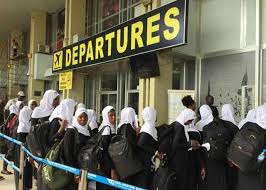The Government of Uganda has issued a strong warning to all licensed external labour recruitment agencies, following a sharp rise in cases of Ugandan migrant workers—especially domestic workers in Saudi Arabia—fleeing their employers and becoming stranded without legal protection.
In an official letter dated October 15, 2025, signed by Dr. Lawrence Egulu on behalf of the Permanent Secretary, Ministry of Gender, Labour and Social Development (MGLSD), the government described the spike in “runaway” cases as a serious and persistent challenge that threatens both the safety of workers and Uganda’s bilateral labour relations.
“While some migrant workers have genuine reasons for opting out of their employers’ households, middlemen and women have unfortunately lured others into ‘Mama Blymphahs’ households with false promises of better pay,” Dr. Egulu noted in the letter.
He said the majority of those who abandon their jobs lose their legal residency status, becoming irregular migrants who face detention, abuse, or deportation due to lack of documentation and consular protection.
The MGLSD reminded all licensed external recruitment firms that they remain fully responsible for the welfare of Ugandan migrant workers throughout their contracts — including while in service abroad and after returning home.
To curb the rising crisis, the ministry directed recruitment agencies to:
• Report missing or absconding workers immediately to the Ugandan Embassy and the Ministry of Gender.
• Maintain active communication with partner companies and sponsors abroad to trace missing workers.
• Cover all repatriation costs, including transportation of remains and payment of any outstanding entitlements to deceased workers’ families.
“The purpose of this letter is to urge all recruitment companies to always put the welfare and rights of the migrant worker at the center of their operations,” the Ministry emphasized.
According to statistics from the Uganda Association of External Recruitment Agencies (UAERA), more than 4,200 Ugandan migrant workers—mostly women working as domestic helpers—have fled their employers in Saudi Arabia and other Gulf states since 2022.
Nearly 60% of the affected are young women aged 21 to 30 years, many of whom were deceived by unlicensed middlemen who promised better jobs or salaries than what was stated in their contracts.
Uganda’s External Employment Management Information System (EEMIS) records show that over 200,000 Ugandans are legally deployed abroad, with Saudi Arabia hosting more than 120,000 of them.
Remittances from these migrant workers contribute an estimated USD 1.2 billion annually, making labour export one of Uganda’s top three sources of foreign exchange—alongside tourism and coffee.
However, officials warn that the rise in irregular migration, contract breaches, and worker abuse could jeopardize the sector’s credibility and strain diplomatic ties with host countries.
The Ministry of Gender has announced plans to launch joint compliance audits before December 2025 on all licensed labour export firms.
This follows reports that some companies have been subcontracting unlicensed brokers, a practice that contravenes the Employment (Recruitment of Ugandan Migrant Workers Abroad) Regulations, 2021.
“We expect all recruitment agencies to cooperate fully with embassies and labour attachés in tracing missing workers and resolving disputes in line with Uganda’s bilateral labour agreements,” Dr. Egulu stated.
The ministry is also working with the Ministry of Foreign Affairs, Ugandan missions abroad, and Migrant Workers’ Associations to strengthen welfare monitoring, improve case reporting, and enhance pre-departure training.
The issue of runaway domestic workers has long strained relations between Uganda and Middle Eastern states.
In 2023, at least 35 Ugandans were repatriated from Saudi Arabia after being found stranded in Riyadh and Jeddah.
Most cited contract substitution, unpaid wages, long working hours, and poor living conditions as reasons for fleeing.
Saudi authorities have repeatedly urged Uganda to regulate recruitment intermediaries and ensure workers adhere to their contracts, while Uganda insists on stronger protections for its nationals abroad.
Labour rights activists have welcomed the government’s renewed action but urged authorities to prioritize protection and education over punishment.
“Many of these young women are victims of misinformation and exploitation. The government must invest in pre-departure orientation, legal aid, and emergency shelters for distressed workers,” said Sarah Namusoke, a migration policy advocate with the Platform for Labour Justice (PLJ).
She added that Uganda’s reputation as a reliable labour source depends on ethical recruitment practices and strict enforcement against rogue agencies.
As the labour export sector continues to grow, authorities are emphasizing shared responsibility among government agencies, recruitment firms, and host-country partners.
“Labour migration is an opportunity for national development,” Dr. Egulu noted, “but it must be managed responsibly to protect the dignity and rights of every Ugandan worker abroad.”
With Uganda planning to expand bilateral labour agreements to Qatar, Oman, and the UAE, officials say stricter compliance and monitoring will be key to ensuring the safety and welfare of migrant workers in the years ahead.



